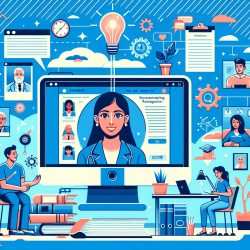The field of special education continually evolves, and one of the most promising developments in recent years is the expansion of online therapy services. As practitioners, it is crucial to stay informed about how human rights frameworks can help us ensure equitable access to these services. Drawing inspiration from the research article "Employing human rights frameworks to realize access to an HIV cure," we can implement similar strategies to improve access to online therapy in schools.
Understanding the Human Rights Framework
The human rights framework provides a robust foundation for ensuring that all students, regardless of their background or abilities, have access to the services they need. This framework is built on several key principles:
- Availability: Services must be available in sufficient quantity and quality.
- Accessibility: Services must be accessible to everyone without discrimination.
- Acceptability: Services must be culturally appropriate and respectful of individuals' needs.
- Quality: Services must be scientifically and medically appropriate and of good quality.
Applying These Principles to Online Therapy
Online therapy, especially in the context of special education, can greatly benefit from these human rights principles. Here’s how practitioners can implement these principles:
Availability
To ensure availability, schools and districts must invest in the necessary infrastructure and resources. This includes:
- Providing adequate funding for online therapy programs.
- Ensuring a sufficient number of qualified therapists are available.
- Offering a range of services that cater to different needs, such as speech therapy, occupational therapy, and counseling.
Accessibility
Accessibility is critical in ensuring that all students can benefit from online therapy services. Practitioners can advocate for:
- Removing barriers that prevent students from accessing services, such as lack of internet connectivity or devices.
- Providing services in multiple languages to cater to non-English speaking students.
- Ensuring services are accessible to students with disabilities, including those with visual or hearing impairments.
Acceptability
Acceptability involves tailoring services to meet the cultural and individual needs of students. This can be achieved by:
- Engaging with families and communities to understand their needs and preferences.
- Providing culturally sensitive therapy that respects students' backgrounds and experiences.
- Offering flexible scheduling to accommodate different family dynamics and routines.
Quality
Quality is paramount in delivering effective online therapy. Practitioners should ensure that:
- Therapists are well-trained and continually update their skills.
- Services are based on the latest evidence and best practices.
- Regular evaluations are conducted to assess the effectiveness of therapy programs.
Encouraging Further Research
While these principles provide a solid foundation, continuous research is essential to adapt and improve online therapy services. Practitioners should be encouraged to:
- Stay updated with the latest research and developments in the field.
- Participate in professional development opportunities.
- Engage in collaborative research projects to explore new methods and technologies.
By implementing these strategies, practitioners can significantly enhance the quality and accessibility of online therapy services in schools, ensuring that all students receive the support they need to thrive.To read the original research paper, please follow this link:
Employing human rights frameworks to realize access to an HIV cure.










